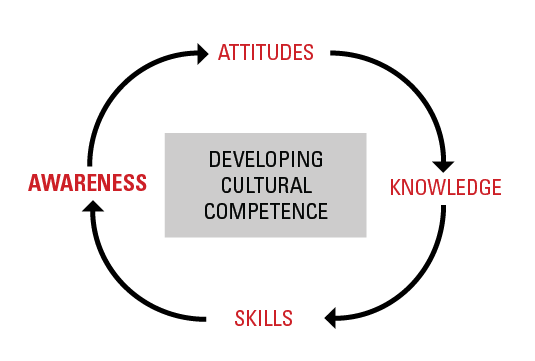Intercultural Competence and Cultural Identity: Navigating Diversity in a Globalized World
In today’s interconnected world, intercultural competence and cultural identity are critical concepts that influence how individuals and societies interact. Understanding and developing intercultural competence can enhance communication, foster inclusivity, and create more harmonious interactions across diverse cultural backgrounds. This article explores the importance of intercultural competence and cultural identity, their components, and their impact on personal and professional relationships.

What is Intercultural Competence?
Definition of Intercultural Competence
Intercultural competence refers to the ability to interact effectively and appropriately with people from different cultural backgrounds. It involves understanding and respecting cultural differences, adapting communication styles, and demonstrating empathy and open-mindedness.
Components of Intercultural Competence
- Cognitive Component: Knowledge of cultural norms, values, and practices. This includes understanding the cultural contexts of communication and behavior.
- Affective Component: Attitudes and feelings towards cultural diversity, including curiosity, openness, and respect for other cultures.
- Behavioral Component: Skills in adapting communication and behavior to fit cultural contexts. This includes language proficiency, non-verbal communication, and conflict resolution.
What is Cultural Identity?
Definition of Cultural Identity
Cultural identity refers to the sense of belonging to a group or culture. It is shaped by various factors, including ethnicity, nationality, language, religion, and traditions. Cultural identity influences how individuals perceive themselves and how they interact with others.
Components of Cultural Identity
- Personal Identity: Individual attributes and experiences that define who a person is within their cultural context.
- Collective Identity: Shared characteristics and values that define a group or community. This includes ethnic, national, and religious identities.
- Social Identity: The roles and statuses individuals hold in their cultural and social groups. This includes professional roles, family roles, and community involvement.
The Relationship Between Intercultural Competence and Cultural Identity
Enhancing Intercultural Competence Through Cultural Identity
Understanding one’s cultural identity is a crucial step in developing intercultural competence. Recognizing one’s own cultural biases and perspectives allows individuals to approach intercultural interactions with greater empathy and sensitivity.
Impact of Cultural Identity on Intercultural Interactions
Cultural identity shapes how individuals communicate and interact with others. For instance, a person from a collectivist culture may prioritize group harmony and indirect communication, while someone from an individualistic culture may value directness and personal achievement. Awareness of these differences can prevent misunderstandings and improve communication.
Developing Intercultural Competence
Education and Training
Education and training programs focused on intercultural competence can provide individuals with the knowledge and skills needed to navigate cultural diversity. These programs often include cultural awareness training, language courses, and experiential learning opportunities, such as study abroad programs or cultural immersion experiences.
Active Listening and Empathy
Active listening and empathy are critical skills for intercultural competence. By genuinely listening to and understanding others’ perspectives, individuals can build trust and rapport across cultural boundaries. Empathy allows individuals to connect with others on an emotional level, fostering deeper and more meaningful interactions.
Flexibility and Adaptability
Flexibility and adaptability are essential for navigating cultural differences. This involves being open to new experiences, willing to adjust one’s behavior, and able to cope with uncertainty and ambiguity. Adapting to different cultural norms and practices can enhance communication and collaboration in multicultural environments.
The Importance of Intercultural Competence in Various Contexts
Workplace
In the workplace, intercultural competence is vital for fostering an inclusive and productive environment. As businesses become more global, employees must interact with colleagues, clients, and partners from diverse cultural backgrounds. Intercultural competence can improve teamwork, enhance customer relations, and drive innovation by incorporating diverse perspectives.
Education
In educational settings, intercultural competence helps create inclusive classrooms where students from different cultural backgrounds feel valued and respected. Educators with intercultural competence can design curricula that reflect diverse perspectives and foster a culture of inclusivity and mutual respect.
Personal Relationships
Intercultural competence also enhances personal relationships by promoting understanding and reducing conflicts. Whether in friendships, romantic relationships, or family interactions, being able to navigate cultural differences can strengthen bonds and create more harmonious interactions.
Challenges in Developing Intercultural Competence
Overcoming Stereotypes and Prejudices
Stereotypes and prejudices can hinder the development of intercultural competence. Overcoming these biases requires self-reflection, education, and a commitment to challenging one’s assumptions. Engaging with diverse communities and seeking out diverse perspectives can help break down stereotypes.
Navigating Cultural Shock
Cultural shock can occur when individuals are exposed to new and unfamiliar cultural environments. This can lead to feelings of confusion, frustration, and disorientation. Developing coping strategies, such as seeking support and staying open-minded, can help individuals navigate cultural shock and adapt to new cultural contexts.
Conclusion
Intercultural competence and cultural identity are essential for thriving in a diverse and globalized world. By understanding and embracing cultural differences, individuals can enhance their communication skills, build stronger relationships, and contribute to more inclusive and harmonious communities. Developing intercultural competence involves ongoing learning, self-reflection, and a commitment to empathy and adaptability. As we continue to interact with people from diverse cultural backgrounds, these skills will become increasingly important in fostering mutual understanding and respect.
